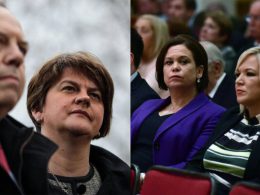At a high profile conference in January Sinn Fein called for a referendum on the border to be held during the next Stormont Assembly term. In practice this means before 2020. Almost immediately, the DUP’s Arlene Foster surprised Sinn Fein by suggesting that it might agree to a border poll.
The power to call a border poll actually rests with the British government, through the person of the Secretary of State, Teresa Villiers. The British government fears that a poll will further destabilise an already unstable situation and do not want to call one now or in the near future. The position of the Irish government has been outlined by Enda Kenny, and is exactly the same. Despite this the two governments would find it difficult to refuse a poll if the two main parties in the North called for one consistently.
Sinn Fein has launched its campaign to reassure its base that its long term aim of a united Ireland is still on track. It is conscious that raising the issue of a border poll will increase sectarian tension. It also knows that a prolonged campaign on the issue will help to divert attention from the part it plays in the cuts government at Stormont.
Sinn Fein’s approach is based on the mathematics of sectarian division and the logic of capitalist economics. It argues that a united Ireland would be a more efficient capitalist system than the current set-up. Whilst it pays lip service to the idea of “persuading” Protestants of the benefits of a united Ireland it makes no bones of its bottom line: Catholics will sooner or later vote them into a united Ireland regardless of their wishes.
For several years Sinn Fein and nationalist commentators have been eagerly awaiting the publication of the 2011 census results. In 2011 48% of the population were either Protestant or brought up as Protestant, a drop of 5% from the 2001 census. 45% of the population were either Catholic or brought up as Catholic, an increase of 1%. These figures demonstrate that the demographic balance is shifting, but more slowly than expected.
Unionists point to a recent opinion poll for the BBC which show that a clear majority of the population of the North, 67%, are in favour of remaining in the UK and that only 35% of Catholics state clearly that they would vote for a united Ireland in a referendum, 38% of Catholics say they would vote to stay in the UK. For the nationalist parties the poll raised issues with 56% of SDLP voters saying they would vote to remain in the UK and 23% of Sinn Fein voters also stating they would vote to remain within the UK.
For Sinn Fein, and the SDLP, the issue of a border poll is a simple one of “democracy”. In their view, if Northern Ireland has a Catholic majority then the border can be voted away. They hold that demographic change is inexorably moving in one direction. At that point Protestants should ‘accept reality’ and “move on”.
This line of argument displays a profound amnesia. For three generations Catholics in Northern Ireland refused to recognise the “democracy” of Northern Ireland. In their view, they had been coerced into an artificial statelet and they would not bow down and accept this situation. They were perfectly justified in this stance. Why now do nationalist and republican politicians assume that Protestants must accept the formal democracy of losing their majority position in the North which, on the basis of capitalism, raises real fears among working-class Protestants that they will become a disadvantaged, discriminated against new minority community?
There has been one previous border poll. In March 1973 591,820 votes (98.9% of votes cast) went in favour of the question “Do you want Northern Ireland to remain part of the United Kingdom?” Only 6463 (or 1.1%) voted for the question “Do you want Northern Ireland to be joined with the Republic of Ireland outside the United Kingdom?” The figures were entirely distorted however as both republicans and the SDLP called for a boycott of the poll.
Catholics did not accept the existence of Northern Ireland, and were not about to allow it to gain any validity as the result of an exercise at the ballot box. As a result 425,828 people (41% of Electorate) did not vote. If the unionist parties believed that they would lose a poll in the future then a boycott would be the most obvious tactic to employ. And if any vote goes against a united Ireland, as in 1973, Catholics will not simply accept the existence of Northern Ireland, but will look forward to the next poll.
Above all else, the furore over even the possibility of a border poll, illustrates the impasse working class people in the North face under capitalism. The system cannot deliver on social and economic issues and it cannot even begin to resolve the tensions and divisions around the national question. The only alternative to conflict, which will otherwise inevitably worsen over time, is that class issues come to the fore and that class politics asserts itself. Working class people, Catholic and Protestant, have more in common than divides them. They are united in their trade unions and can potentially be united politically through the development of a mass working class party which builds in both Catholic and Protestant areas. Then the question of the border, and the rights of all, can be addressed, through a transition to a socialist Ireland, and a socialist federation of Ireland, Scotland, England and Wales. The future can be different but it is necessary to change society, not just remove a line from the map, to make it so.











